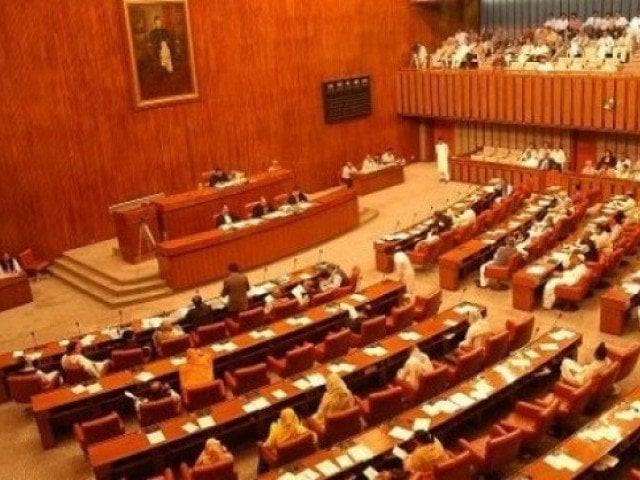Aftermath: reform the Senate
Our democracy, inspired by our cricket team, is nothing if not unpredictable

PHOTO: FILE
When 64 senators gave their support for a no-confidence motion against the Chairman of the Senate, Sadiq Sanjrani, it seemed like the opposition might as well get the mithai ready for distribution. They only needed 53 votes to succeed after all.
Except when the votes were counted, the opposition found themselves three votes short.
Our democracy, inspired by our cricket team, is nothing if not unpredictable.
In the aftermath of the vote, everyone from the establishment to the guy who mops the floor was blamed for the opposition’s failure. Fourteen senators had done the proverbial 180 on their own political parties.
The shock was too much for Mir Hasil Bizenjo, the opposition’s candidate for the seat that Sanjrani is still somehow occupying, who wasted no time in blaming our premier intelligence agency for the fiasco. Outrage was also directed towards the pesky secret ballot which means that the opposition can only guess at who betrayed them in the final vote.
The Senate doesn’t enter the national discourse often. But when it does, everyone seems to agree that the way it operates needs to change. Imran Khan said it last year when horse-trading ran rampant. Bilawal and Shehbaz are saying it now after seeing their plans crumble last week.
This time around, most of the criticism is directed towards the secret ballot. The argument being that it creates a conducive environment for manipulating, bribing, and pressurising senators to betray their own political parties.
Doing away with the secret ballot would require amending the Constitution (and not simply, as some people have argued, amending the Senate Rules of Procedure), since Article 226 of the Constitution makes the secret ballot mandatory for all elections under the Constitution, except, that of the Prime Minister and the Chief Minister.
Currently, no political party has the numbers to do so. But even if they did, we need to think long and hard before doing away with a constitutional provision. That is the respect a Constitution deserves.
The secret ballot is not entirely a flawed concept. It has always been seen as an important element in a democracy, as it allows voting to occur without the fear of reprisals.
The lack of a secret ballot mechanism in the Senate could force senators to strangle their conscience while electing the chairman. Fearing the wrath of the party they belong to. It is entirely possible that some senators from the opposition saw no reason to remove Sadiq Sanjrani given that the opposition never gave a convincing narrative that substantiated the move.
Dissent within party ranks is not unheard of in a democracy. The United Kingdom has a wonderful tradition of ‘backbenchers’ that sometimes take on this role. So, if the sole argument for doing away with the secret ballot is so that party members can become robotic voting machines for their political parties, then that is not a convincing reason to do away with a constitutional provision.
However, it is hard to deny that the secret ballot does create a conducive environment for selling votes, horse-trading, and voters being influenced. So how do we solve this conundrum and come out of it with a stronger, more democratic Senate?
The way forward is to change the way people are elected to the Senate.
Senators are elected through indirect elections via the single-transferable vote. They are not directly elected by the people of Pakistan. Indirect elections result in a smaller pool of voters, making it easier to buy votes as opposed to direct elections. Direct elections to the Senate can help curb this menace that has succeeded in cheapening the value of senators in our democracy.
Last year’s Senate elections saw horse-trading run rampant after the overthrow of the Zehri government in Balochistan. No democratic system should take such desensitisation towards the buying of votes lightly.
Making members of the Senate directly elected by the people will also make the argument for removing the secret ballot stronger. Because then, the people, the demos in democracy, have a right to know how their elected representatives are voting. That is a far better reason to do away with the secret ballot than the reasons being given by the opposition currently.
Furthermore, it makes sense, given how the Constitution makes an exception for the elections of Prime Minister and Chief Minister, the reason being that those posts come about through direct elections as well. If the Senate was directly elected, then, the secret ballot can be taken away in the greater interest of democracy.
That the working of the Senate is flawed may be something that the PTI and the opposition can agree on. Both have now felt the pain of a faulty democratic procedure: the PTI last year and the opposition parties last week. Perhaps for once, both can agree on something and make our democracy stronger?
Published in The Express Tribune, August 6th, 2019.
Like Opinion & Editorial on Facebook, follow @ETOpEd on Twitter to receive all updates on all our daily pieces.














COMMENTS
Comments are moderated and generally will be posted if they are on-topic and not abusive.
For more information, please see our Comments FAQ